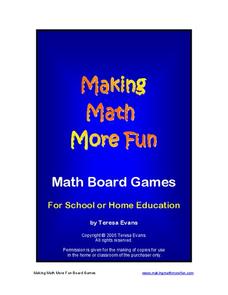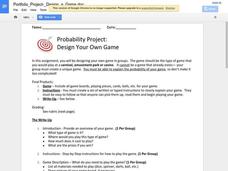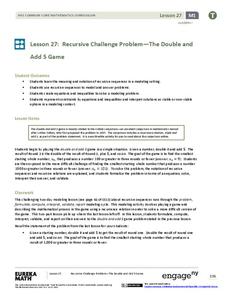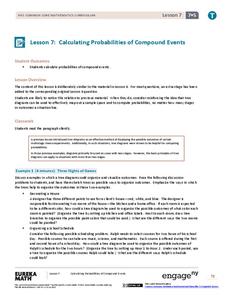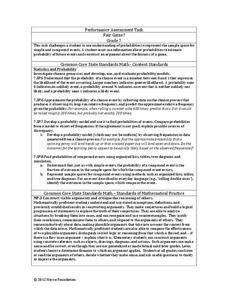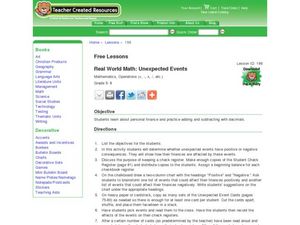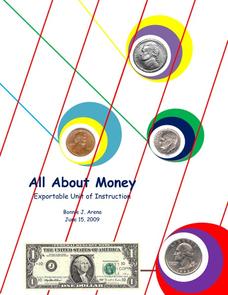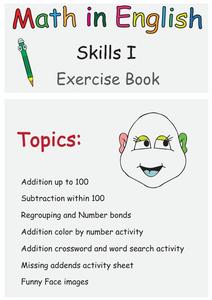Curated OER
Math Games for Skills and Concepts
A 27-page packet full of math games and activities builds on algebra, measurement, geometry, fractional, and graphing skills. Young mathematicians participate in math games collaboratively, promoting teamwork and skills practice.
Curated OER
Making Math More Fun
Trick young mathematicians into practicing their basic arithmetic with this extensive collection of fun math games. Whether you're teaching addition, subtraction, multiplication, division, place value, or even fractions, there is a...
Making Math More Fun
Making Math More Fun
Address fundamental math skills with a series of fun math board games. With 25 games that focus on addition, subtraction, multiplication, division, place value, and percentages, kids will quickly find that math practice is their favorite...
Google
Probability Project: Design Your Own Game
Designing a game is the focus of this probability lesson. Groups develop and build a unique game, including directions for how to play, a calculation of the expected value of winning, and a personal reflection. The plan provides a...
Curated OER
Mixed Math Millionaire: Math Game
Play a game to review a variety of math concepts. Factoring, square roots, number sequences, division, multiplication, order of operations, and word problems are all covered in this Millionaire style quiz game. Tip: Keep this resource as...
K-5 Math Teaching Resources
Math Center Labels
From counters and calculators to pattern blocks and Unifix cubes, this collection of printable labels has exactly what you need to bring some organization to your elementary math class.
EngageNY
Recursive Challenge Problem—The Double and Add 5 Game
As a continuation of a previous instructional activity, this activity builds on the concept of calculating the terms of a sequence. Pupils are challenged to determine the smallest starting term to reach a set number by a set number of...
CK-12 Foundation
Expected Value: Game of Chance
Determine whether the payoff is worth it. Pupils calculate the expected value of a game with three different payoff levels. Each level has a different probability of winning money. The scholars find the expected payoffs for each...
Benjamin Franklin High School
Saxon Math: Algebra 2 (Section 4)
This fourth of twelve units in a series continues the investigation of functions through equations and inequalities. However, the modular nature of the lessons in the section make this an excellent resource for any curriculum...
Inside Mathematics
Marble Game
Pupils determine the theoretical probability of winning a game of marbles. Individuals compare the theoretical probability to experimental probability for the same game. They continue on to compare two different probability games.
EngageNY
Calculating Probabilities of Compound Events
Use tree diagrams with multiple branches to calculate the probabilities of compound events. Pupils use tree diagrams to find the sample space for probability problems and use them to determine the probability of compound events in the...
Noyce Foundation
Fair Game?
The game should be fair at all costs. The mini-assessment revolves around the ability to use probabilities to determine whether a game is fair. Individuals determine compound events to calculate simple probabilities and make...
EngageNY
Grade 5 Math Module 1: End-of-Module Assessment
The last installment of the 18-part Grade 5 Math Module 1 is an end-of-module assessment. Scholars answer questions that require explaining the connection between powers of 10 and place value, rewriting decimals in different forms,...
Heather Sparks
Integer Football
They could go all, the, way...to a deeper understanding of integers with this fun math game. Using the included printable materials, young mathematicians practice adding integers and calculating absolute values as they compete in a...
Curated OER
Real World Math: Unexpected Events
Ready to delve into personal finance? Learners discover how to organize a check book register. They practice debits and credits in a math game involving the register they set up. While they gain valuable practical knowledge, they also...
Curated OER
How Fast is Usain Bolt?
Revisit the 2012 Summer Olympics by having seventh graders calculate the unit rate sprinting speed of the 100-meter gold medal winner.
Curated OER
Football Math
Develop an understanding of positive and negative numbers using football. Pupils create a football field and game pieces. The teacher gives plays and the pupils move pieces to see who wins the game.
Mrs. Burke's Math Page
Let Them Eat Pi
Looking for a fun and creative way to celebrate Pi Day? Then this is the resource for you. From a scavenger hunt and trivia contest to PowerPoint presentations and skills practice worksheets, this collection of materials is a...
Curated OER
All About Money
Few topics engage young mathematicians as much as learning about money. Through a series of shared readings and hands-on activities, children explore the US currency system, learning how to count money and calculate change as they create...
Curated OER
What's My Calculation?
Learners play a simple multiplication game in which they look at the number on each of the slides, and write down the multiplication facts that would give them that number. For example, 24 could get four different factor pairs. Fun...
Curated OER
Math in English Skills I Exercise Book: Addition and Subtraction
Whether your pupils need extra help or they simply need to practice their basic computation skills, this packet will do the trick. It includes a written rationale, answer key, and over 10 pages of double-digit addition and subtraction...
Virginia Department of Education
Exploring 3-D Geometry
Take young mathematicians on an exploration of the world of 3-D geometry with this seven-lesson unit. After first defining the terms perimeter, area, and volume and how they apply to the real world, students continue on...
EngageNY
Games of Chance and Expected Value 1
There's a strong chance that class members enjoy learning math through engaging games. Scholars analyze games of chance to determine long-term behavior. They learn to calculate expected value to help with this assessment.




